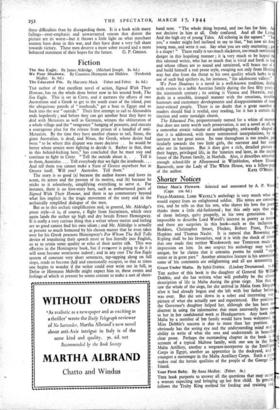Fiction
The Sea Eagle. By James Aldridge. (Michael Joseph. 8s. 6d.) We Poor Shadows. By Countess Hermynia zur Miihlen. (Frederick Muller. 8s. 6d.) The Educated Pin. By Marjorie Mack. (Faber and Faber. 8s. 6d.)
THE author of that excellent novel of action, Signed With Their Honour, has on the whole done better now in his second book, The Sea Eagle. This is set in Crete, and it narrates the efforts of two Australians and a Greek to get to the south coast of the island, past the ubiquitous patrols of " ironheads," get a boat to Egypt and so back into the war " outside." Their first attempt to sail to Alexandria ends hopelessly ; and before they can get another boat they have to deal with Metaxists as well as Germans, witness the obliteration of a whole village and the " vengeance " hanging of peasants, and execute a courageous plan for the release from prison of a handful of anti- Metaxists. By the time they have another chance to sail, Stone, the giant Australian, is dead, and Nisus, the Greek, whose desire had been " to be where this dispute was more decisive . . he would be better where armies were fighting to decide it. Rather in that, than in this behind-kicking here," has concluded that he must stay and continue to fight in Crete. " Tell the outside about it. . . Tell it to them, Australos.... Tell everybody that we fight the ironheads.... And tell them you cannot make a State of Greece anywhere but in Greece itself. Will you? Australos. Tell them."
The story is so good (a) because the author knows and loves its scene, its actors and the passion of its motive, and (b) because he sticks to it relentlessly, simplifying everything to serve rt. For instance, there is no love-story here, such as embarrassed parts of Signed With Their Honour, and there is no commentary beyond what lies implicit in the tragic movement of the story and in the archaically simplified dialogue of the men.
But as to this archaic simplification and, in general, Mr. Aldridge's prose style—it is, of course, a flight from literariness, which once again lands the author up high and dry beside Ernest Hemingway. It is really a very curious thing that a writer whose matter and feeling are so good cannot find his own idiom ; and Mr. Aldridge is actually at present so much bemused by his chosen master that he even takes over for his Greek peasants Hemingway's For Whom The Bell Tolls device of translating their speech more or less literally into English, so as to retain some quality or echo of their native talk. This was effective in the Hemingway book, but if everfore is going to do it it will soon become wearisome indeed ; and in any case The Sea Eagle system of constant very short sentences, tap-tapping along on full stops, tends to become dull and emotionally escapist, so that at times one begins to wonder if the writer could ever write out in full, as Defoe or Hermann Melville might expect him to, these events and feelings of which at present he seems content to make a sort of short-
hand note. " The whole thing beyond, and too fast for him. not decisive in him at all. Only confused. And all the Ly And the high cry of young Talos. All echoing in the square." " y yes," a reader might feel inclined to say to that, " but now sit do young man, and write it out. Say what you are only muttering ; g it a shape ! " There really is too much slackness, too much sentime danger in this hopalong manner ; it is very much to be hoped this talented writer, who has so much that is vivid and fresh in h and whose values are so sound and untainted, will brace out of and build himself a real prose style, escaping not only from Hemi way but also from the threat to his own quality which lurks in use of such bad epithets as, for instance, " the adolescent valleys."
We Poor Shadows is a novel in a well-known tradition, deal with events in a noble Austrian family during the first fifty years the nineteenth century ; its setting is Vienna and Moravia, and deals in a sensible, tranquil manner with the emotions, troub humours and customary developments and disappointments of m inter-related people. There is no doubt that a great number readers should find it restful, easy reading, for it has a certain tinction and some nostalgic charm.
The Educated Pin, preposterously named for a whim of memo that does not seem worth such preservation, is not a novel at all, to, a somewhat erratic volume of autobiography, awkwardly shaped that it is addressed, with many sentimental interpolations, by narrator to her great niece. Its tone throughout is too tender, ticularly towards the two little girls, the narrator and her sis who are its heroines. But it does give a rich, detailed picture their happy, privileged life, in the 'nineties and later, in the one house of the Paston family, in Norfolk. Also, it describes amusing enough school-life at Allenswood in Wimbledon, where Elean. Roosevelt, now the Lady of The White House, was a fellow-pu'
to


























 Previous page
Previous page